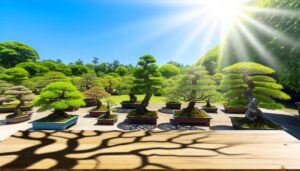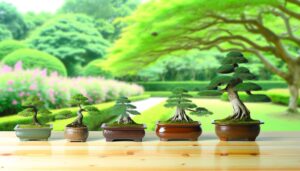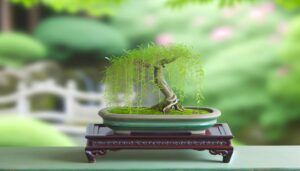How to Gift a Bonsai and Understand Its Meaning
Gifting a bonsai tree symbolizes harmony, balance, and an enduring connection between humans and nature, deeply rooted in Zen Buddhist traditions. It embodies the 'wabi-sabi' philosophy, appreciating imperfection and transience.
Historically, bonsai signifies honor, wisdom, and cultural esteem. It serves as a personal wish for the recipient's growth and mindfulness.
The intricate care required highlights respect and sustained dedication. Ideal for various occasions, a bonsai showcases thoughtful artistic intent, creating a lasting, meaningful gift.
If you're curious about how to select the perfect bonsai for your needs and its proper care, there is more to explore.
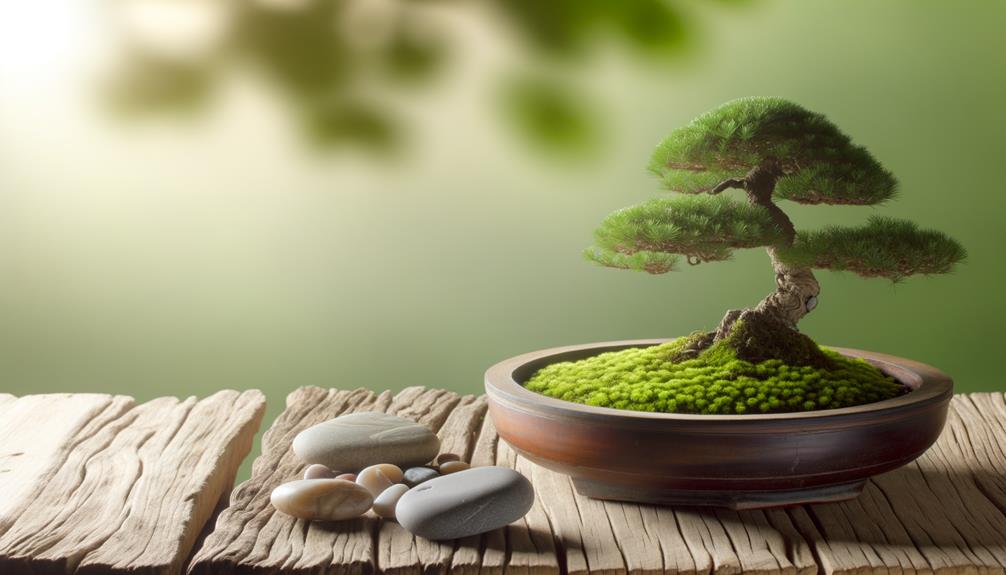
Key Takeaways
- Gifting a bonsai symbolizes a wish for personal and professional growth.
- Bonsai represents harmony in nature and relationships, reflecting Zen Buddhist principles.
- It embodies longevity, wisdom, and cultural appreciation.
- Each bonsai tree is a living testament to thoughtfulness and intent.
- A bonsai gift signifies honor, esteem, and acknowledgment.
Symbol of Harmony
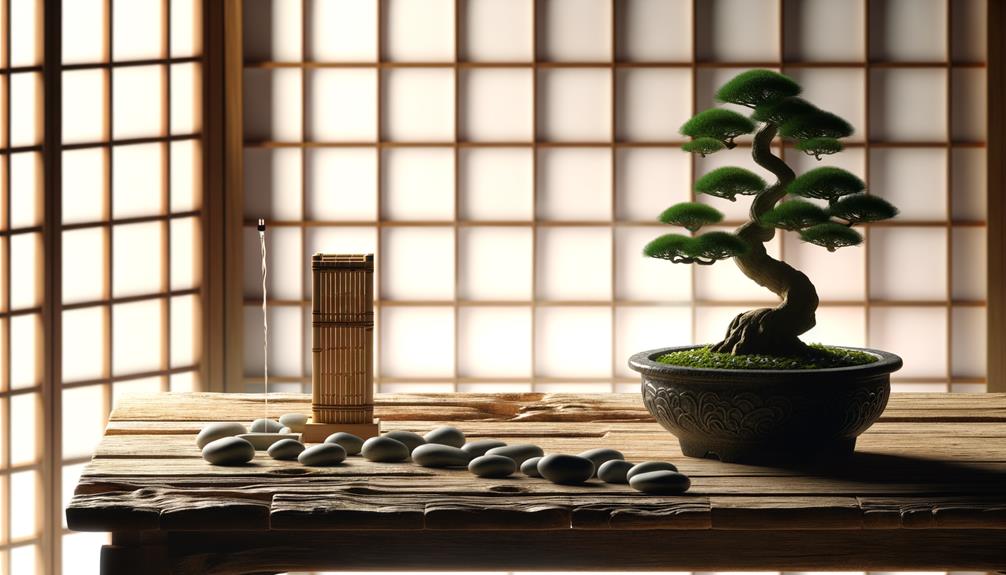
Renowned for its intricate cultivation and meticulous care, the bonsai tree has long been revered as a symbol of harmony within both the natural world and human relationships.
Originating from the ancient Chinese art of penjing, bonsai was later refined by Japanese practitioners who emphasized minimalism and natural beauty.
The process of shaping and nurturing a bonsai tree—through techniques such as pruning, wiring, and root reduction—requires patience and dedication, mirroring the careful cultivation of interpersonal relationships.
Historically, bonsai trees were considered a reflection of Zen Buddhist principles, embodying the balance between nature and human effort.
This meticulous art form fosters a deep connection between the cultivator and the tree, symbolizing the harmonious relationship between humans and their environment.
Emblem of Balance
The bonsai tree serves as an emblem of balance, meticulously cultivated to represent the equilibrium between natural forces and human intervention. Originating from the ancient Chinese art of Penjing, bonsai practices were refined in Japan to emphasize proportion, harmony, and simplicity.
This balance is achieved through:
- Pruning Techniques: Ensuring structural symmetry while promoting growth.
- Root Trimming: Controlling root expansion to maintain a miniature size.
- Wiring: Shaping branches to create a balanced form.
- Watering Regimens: Providing consistent yet varied hydration to reflect natural cycles.
Each practice aligns with the philosophy of 'wabi-sabi,' celebrating imperfection and transience, encapsulating the delicate balance between nature and nurture.
For centuries, bonsai has symbolized this harmonious relationship, making it a profound gift that conveys deeper meaning.
Patience and Care
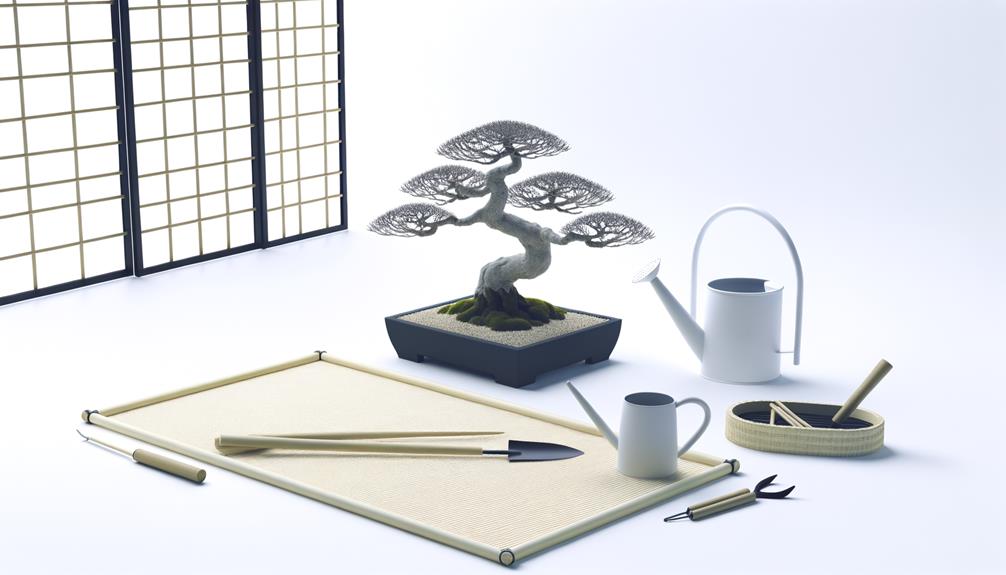
Cultivating a bonsai tree demands a significant investment of time and meticulous attention, reflecting the virtues of patience and care integral to its growth and maintenance.
Originating from ancient Chinese horticultural practices and refined by Japanese techniques, bonsai cultivation involves precise pruning, wiring, and root management. The horticulturist must regularly monitor soil moisture, nutrient levels, and sunlight exposure to ensure the miniature tree's peak health.
Seasonal tasks such as repotting and pest control further underscore the commitment required. This enduring process symbolizes a deep-seated dedication, mirroring the historical significance of bonsai as a form of living art.
Therefore, gifting a bonsai conveys a profound appreciation for the recipient's capacity to nurture, emphasizing the importance of sustained effort and vigilance.
Respect and Thoughtfulness
The presentation of a bonsai tree as a gift holds profound cultural and historical significance, symbolizing honor and esteem towards the recipient.
In Japanese tradition, where the art of bonsai originated, this gesture reflects a deep sense of thoughtfulness and an acknowledgment of the recipient's virtues.
Additionally, the meticulous care required for bonsai cultivation underscores a genuine expression of concern and attentiveness, making it an exceptional embodiment of respect and consideration.
Symbol of Honor
Gifted as a bonsai, the miniature tree embodies a profound symbol of honor, representing deep respect and thoughtful consideration rooted in centuries-old traditions. Originating from the ancient art of penjing in China and refined in Japan, bonsai trees convey a message of reverence and esteem.
- Historical Significance: Bonsai practices date back over a thousand years, showcasing cultural heritage.
- Artistic Craftsmanship: Crafting a bonsai requires meticulous care, reflecting the giver's dedication.
- Enduring Symbolism: Bonsai trees symbolize longevity, wisdom, and eternal respect.
- Cultural Appreciation: Presenting a bonsai honors the recipient's appreciation for the art and tradition.
This intricate art form is not just a gift, but a statement of honor and respect.
Gesture of Care
Presenting a bonsai tree as a gift manifests a deliberate gesture of care, symbolizing not only the giver's respect and thoughtfulness but also a deep understanding of the recipient's appreciation for this refined horticultural art.
The bonsai, with its rich history dating back over a thousand years to ancient China and Japan, represents patience, dedication, and balance. Its meticulous cultivation—pruning, wiring, and shaping—mirrors the giver's intentionality and commitment.
Bonsai care demands attention to detail, signifying the giver's acknowledgment of the recipient's capability to nurture and maintain such a living art form. This act communicates a profound sense of respect and consideration, reflecting an intricate web of cultural significance and personal connection through the timeless tradition of bonsai.
Wish for Growth

Symbolizing a wish for growth, gifting a bonsai tree intertwines deeply with the ancient practice of cultivating miniature trees, embodying centuries of horticultural expertise and philosophical significance. Originating in China over a thousand years ago, and refined in Japan, bonsai cultivation demands meticulous care and unparalleled patience, mirroring the recipient's potential for personal and professional development.
Key elements that underscore this symbolic wish for growth include:
- Pruning Techniques: Encourages controlled growth and resilience.
- Root Trimming: Represents the importance of strong foundations.
- Wiring: Guides the tree's shape, symbolizing life's direction.
- Repotting: Reflects adaptability and the importance of a nurturing environment.
These practices imbue the bonsai with profound meaning, making it an ideal gift for those venturing on new paths.
Promoting Tranquility
In addition to symbolizing growth, a bonsai tree also serves as a powerful emblem of tranquility, cultivated through centuries-old practices that foster mindfulness and inner peace.
Rooted in Zen Buddhism, the meticulous art of bonsai requires careful pruning, wiring, and shaping, which mirrors the meditative discipline of the gardener. This concentrated effort promotes a serene environment, as each deliberate action aids in achieving a balanced, harmonious form.
The miniature scale of bonsai trees invites contemplation, creating a microcosm of nature that encourages reflective thought. Historically, these living sculptures were cherished in Japanese monasteries and homes for their calming influence, embodying the principle of 'wabi-sabi'—the beauty found in imperfection and transience, thereby enhancing mental tranquility.
Cultural Significance
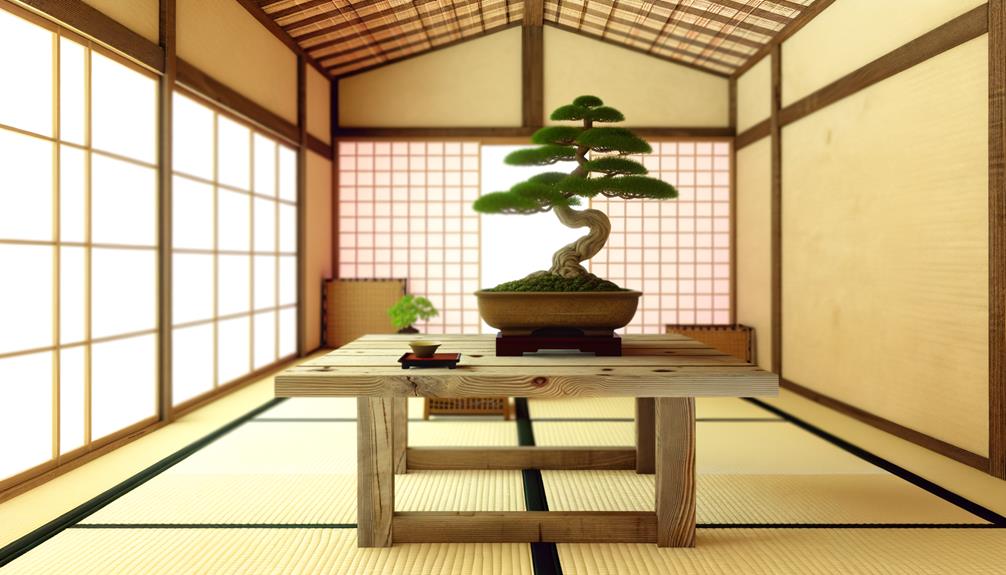
The cultural significance of bonsai extends far beyond its aesthetic appeal, deeply rooted in the historical and philosophical traditions of East Asia, particularly within Japanese and Chinese societies. Originating from the Chinese practice of penjing, bonsai was later refined in Japan to embody Zen Buddhist principles. This art form symbolizes harmony, balance, and patience, reflecting broader cultural values.
Key elements include:
- Wabi-sabi: The Japanese aesthetic of appreciating beauty in imperfection and transience.
- Daoist philosophy: Emphasizing naturalness and simplicity, aligning human life with the natural world.
- Zen Buddhism: Cultivating mindfulness and meditation through the careful tending of bonsai.
- Symbolic representation: Each tree often represents spiritual insights or life stages, making it a profound gift.
Understanding these contexts enriches the appreciation of bonsai as more than mere decoration.
Unique and Memorable
The act of gifting a bonsai tree is a lasting symbolic gesture, rooted in centuries-old horticultural traditions that emphasize patience and meticulous care.
This living art form not only endures as a personalized nature gift but also embodies a unique blend of aesthetic and emotional significance that few other presents can match.
Lasting Symbolic Gesture
A bonsai tree, with its intricate beauty and rich cultural heritage, serves as a lasting symbolic gesture, embodying a unique and memorable gift that transcends ordinary presents.
Rooted in the ancient art form originating from China and refined in Japan, bonsai represents harmony, balance, and patience. The meticulous cultivation process involves techniques such as wiring, pruning, and grafting, which signify dedication and craftsmanship.
- Cultural Significance: Bonsai embodies Zen principles, promoting mindfulness.
- Longevity: With proper care, bonsai trees can live for centuries, symbolizing enduring relationships.
- Artistic Expression: Each tree is a living sculpture, making it a personalized artistic gift.
- Environmental Impact: Bonsai promotes a connection with nature, encouraging environmental consciousness.
These attributes elevate bonsai beyond mere aesthetics, imparting profound symbolic value.
Personalized Nature Gift
In gifting a bonsai tree, one offers a personalized nature gift that encapsulates centuries of horticultural tradition and meticulous artistry, creating a unique and memorable experience for the recipient.
Originating from the ancient Chinese practice of penjing and refined by Japanese horticulturists, bonsai trees represent a harmonious blend of nature and human creativity. The process of cultivating bonsai involves precise pruning, wiring, and potting techniques, requiring both skill and patience.
Each tree, with its intricate form and miniature scale, serves as a living proof of the giver's thoughtfulness and intent. Moreover, a bonsai tree is a dynamic gift that evolves with time, symbolizing growth and endurance, thereby imbuing it with profound personal significance.
Ideal for Any Occasion
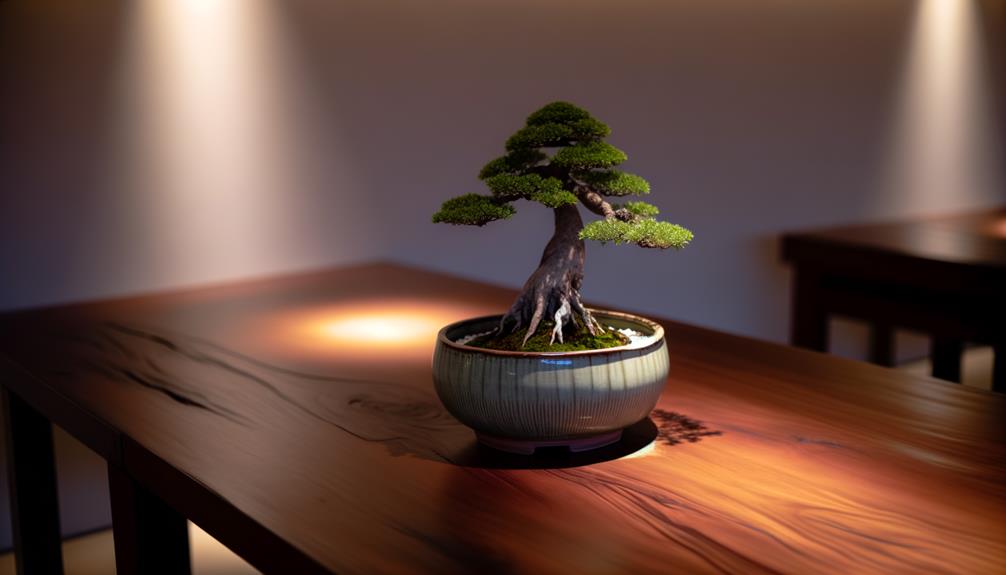
Whether celebrating a birthday, commemorating an anniversary, or marking a significant milestone, bonsai trees serve as an exquisite and meaningful gift choice for virtually any occasion. Originating from the ancient Chinese practice of penjing and refined by Japanese horticulture, bonsai symbolizes harmony, balance, and patience.
Each bonsai tree can be selected to suit various tastes and spaces, making them versatile gifts.
- Birthdays: A living symbol of growth and longevity.
- Anniversaries: Represents enduring love and commitment.
- Milestones: Embodies personal or professional growth.
- Housewarming: Enhances home aesthetics and symbolizes a new beginning.
The historical context and technical intricacies of bonsai cultivation impart a unique, thoughtful touch that resonates deeply with recipients, adding significance to any event.
Long-Lasting Gift
Beyond their symbolic significance for various occasions, bonsai trees offer the added advantage of being a long-lasting gift that, with proper care, can thrive for decades or even centuries.
Originating from ancient Chinese horticultural practices over a thousand years ago and refined by Japanese artisans, bonsai cultivation emphasizes meticulous pruning, wiring, and repotting.
The longevity of a bonsai tree depends on factors such as species, soil composition, and watering regimen. For example, a well-maintained Ficus bonsai can live upwards of 100 years, while a resilient Juniper can flourish for even longer.
This enduring nature transforms bonsai into a living heirloom, imbuing it with historical continuity and personal legacy, making it an exceptional and meaningful gift for generations.
Choosing the Right Bonsai
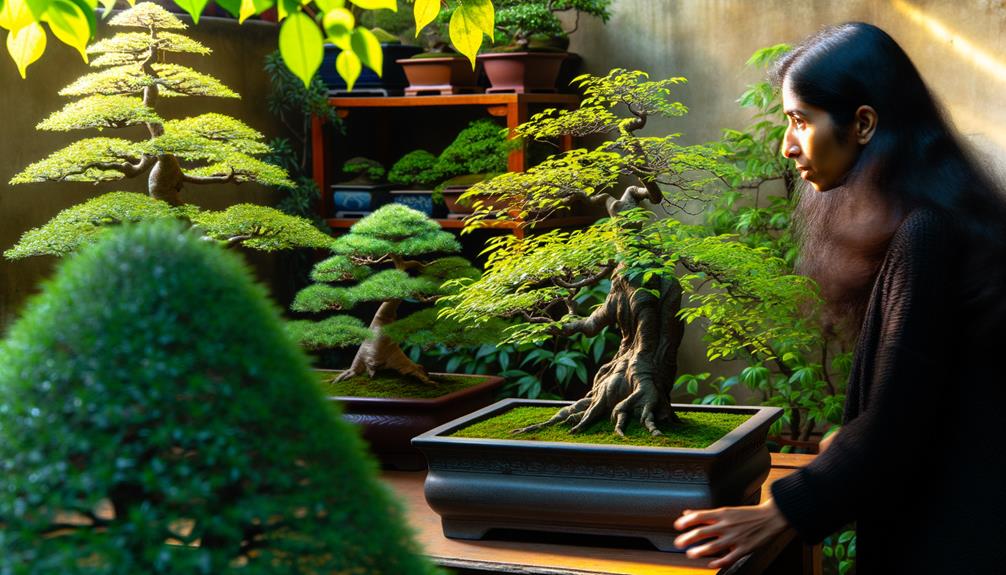
Selecting the ideal bonsai tree demands a thorough understanding of species-specific characteristics, environmental conditions, and the recipient's level of expertise in bonsai cultivation. Historical context reveals that bonsai, originating from ancient Chinese horticultural practices and refined by Japanese aesthetics, demands careful selection to thrive.
Consider the following factors:
- Species Suitability: Species like Juniper and Ficus are beginner-friendly, while Pine and Maple require advanced care.
- Environmental Conditions: Indoor bonsai such as Ficus or Jade differ from outdoor varieties like Juniper or Pine.
- Maintenance Level: Some species require frequent pruning and watering, while others are more resilient.
- Symbolic Meaning: Each bonsai species carries unique symbolism; for instance, Cherry Blossom signifies renewal, while Pine represents longevity.
Understanding these elements assures a meaningful and sustainable gift.
Conclusion
The tradition of gifting a bonsai tree encapsulates a profound symbolism that transcends mere aesthetics.
Much like the meticulous care required to cultivate a bonsai, the recipient's relationship with the tree mirrors the nurturing of human connections.
Historically, samurai would exchange bonsai as tokens of unwavering respect and balance.
Therefore, presenting a bonsai is not merely an act of giving but a gesture steeped in cultural reverence, embodying patience, growth, and enduring relationships.

